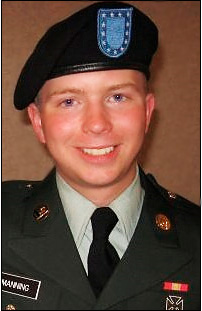
The U.S. Army has launched a new task force to further investigate various details underlying the case of Private First Class Bradley Manning, who has been in pre-trial confinement since last May. The task force was ordered by Army Secretary John McHugh and will be led by Army Lt. Gen. Robert Caslen Jr.
The Army confirmed the new investigation, but wouldn't release details. An Army official familiar with the investigation told McClatchy that the six-member task force has been given until Feb. 1 to complete a report that will look at everything from how Pfc. Bradley Manning was selected for his job and trained to whether his superiors missed warning signs that he was downloading documents he had no need to read.
The report could change how the Army — the largest distributor of government security clearances — grants access to government documents as well as lead to recommendations of charges against soldiers who worked with Manning and may have been aware of his activities.
Manning was first detained in Iraq in May, where he was stationed as an intelligence analyst with the U.S. Army; he was charged in July and transferred to a Marine Corps Brig in Quantico, Virginia and immediately placed in solitary confinement.
Manning, now 23, reportedly isn't cooperating with investigators, and Defense Department officials who've been briefed on the case said according to their most recent information, now months old, no direct tie has been established between Manning and Assange.
Theme by Danetsoft and Danang Probo Sayekti inspired by Maksimer
Think what you want about Ron
Think what you want about Ron Paul, but he summed it right in his questions to the congress:
1. Do the American people deserve to know the truth regarding the ongoing war in Iraq, Afghanistan, Pakistan and Yemen?
2. Could a larger question be: how can an Army Private gain access to so much secret material?
Images
Congressman Ron Paul - wikimedia commons
3. Why is the hostility mostly directed at Assange, the publisher, and not our government’s failure to protect classified information?
4. Are we getting our money’s worth from the $80 billion per year we spend on our intelligence agencies?
5. Which has resulted in the greatest number of deaths; lying us into war, or WikiLeaks’ revelations or the release of the Pentagon Papers?
6. If Assange can be convicted of a crime for publishing information, that he did not steal, what does this say about the future of the First Amendment and the independence of the internet?
7. Could it be that the real reason for the near universal attacks on WikiLeaks is more about secretly maintaining a seriously flawed foreign policy of empire than it is about national security?
8. Is there not a huge difference between releasing secret information to help the enemy in the time of a declared war—which is treason—and the releasing of information to expose our government lies that promote secret wars, death, and corruption?
9. Was it not once considered patriotic to stand up to our government when it’s wrong?
That is indeed a fine summary
That is indeed a fine summary of the questions that should matter to Americans. It should remind people that defending the basic principles of the Bill of Rights is neither a left- nor a right-wing monopoly but a commitment that anyone who cares about democracy will make and defend.